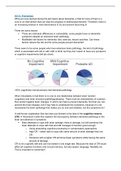College aantekeningen
Lecture 12: Prevention (Neuropsychology of ageing)
This is a summary of the 12th lecture of the course Neuropsychology of Ageing at the VU Amsterdam. The summary is supplemented with extensive notes from the professor and pictures from the slides.
[Meer zien]




